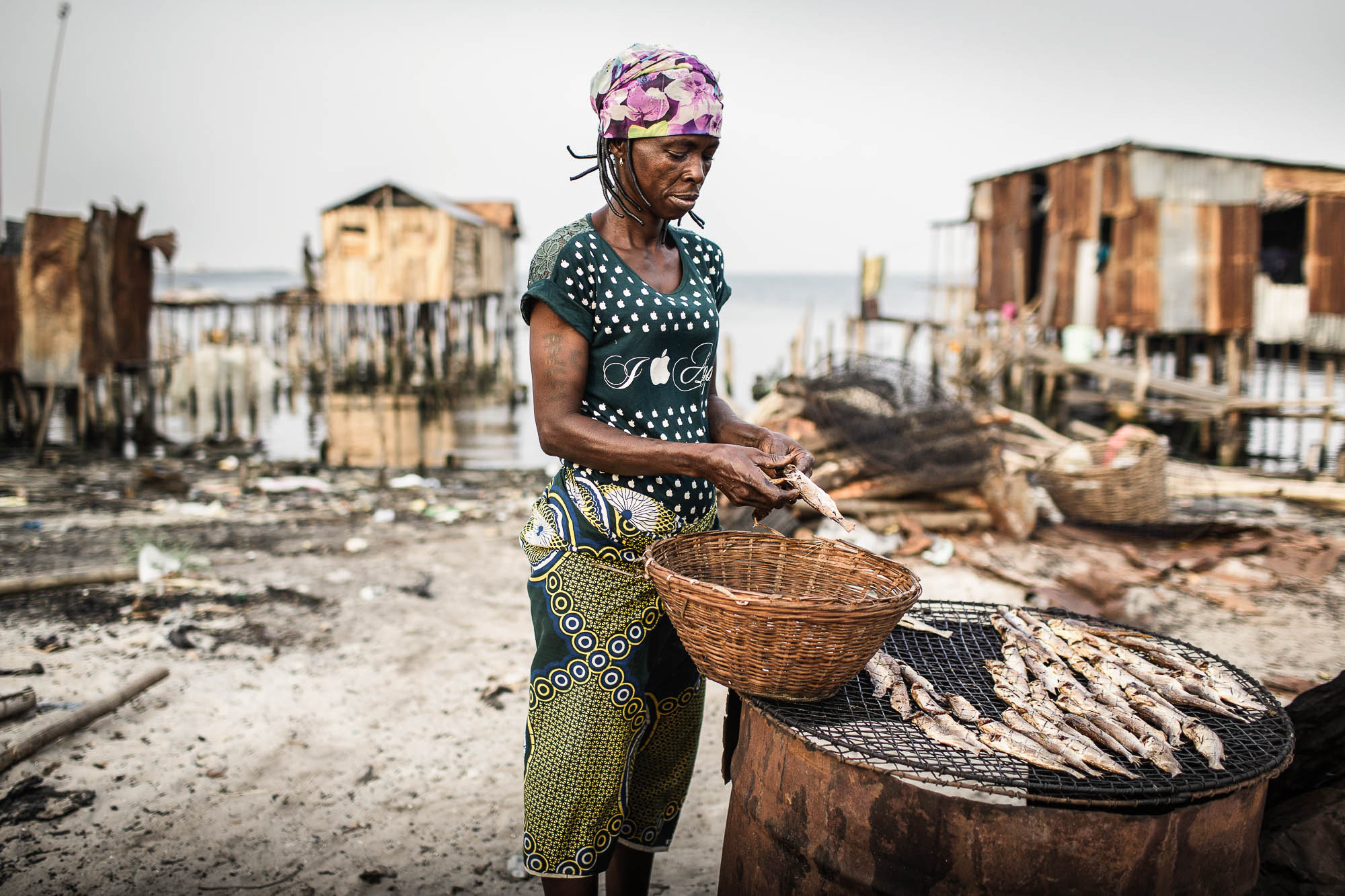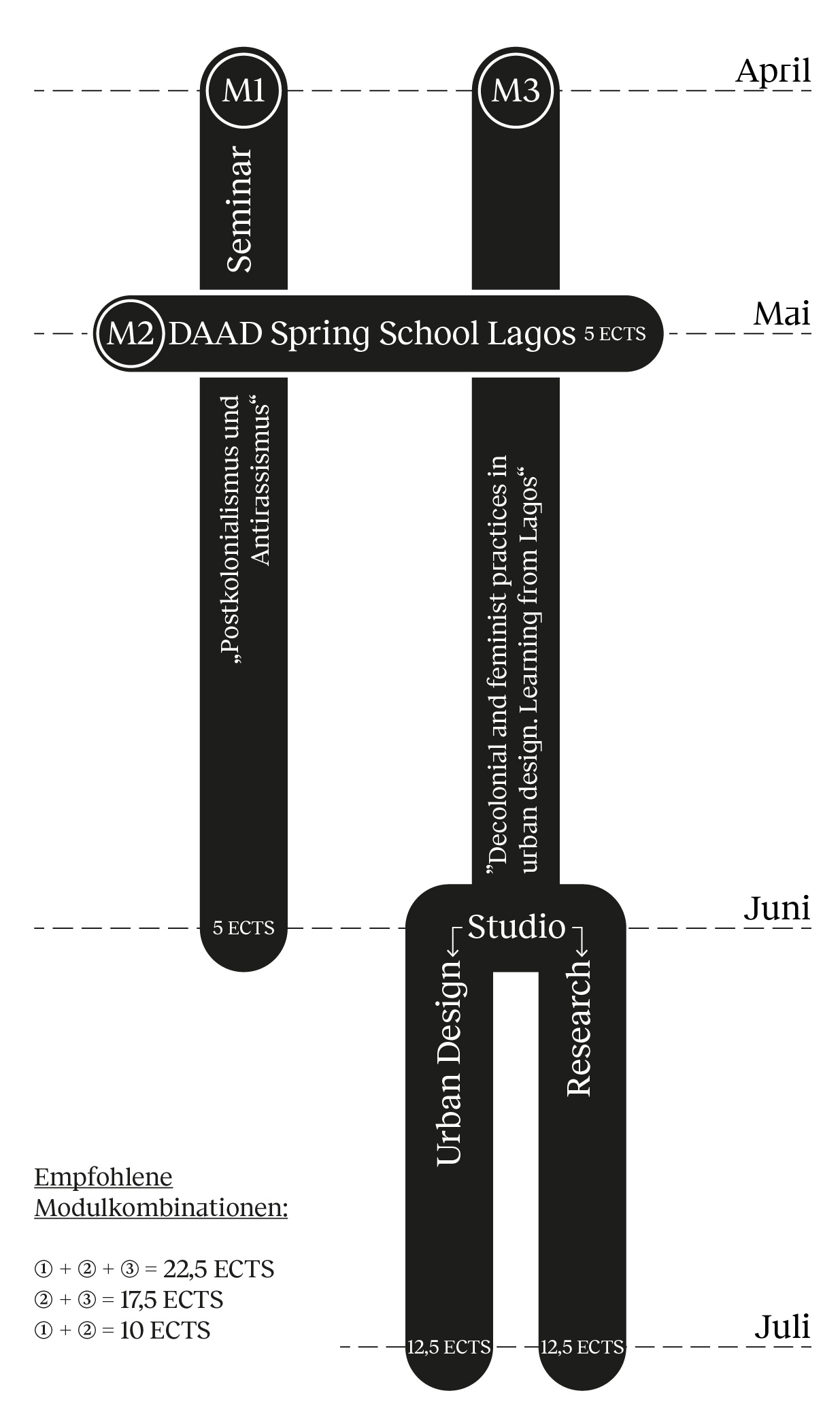Feminist and decolonial
practices in urban design.
Learning from Lagos
Prof.in Fabienne Hoelzel (ABK Stuttgart),
AMin Lisa Dautel (ABK Stuttgart),
Lehrbeauftragte/ lecturer Antonia Dürig (DAAD Spring School),
Lehrbeauftragte/ lecturer Dr. Adeyemi Oginni (University of Lagos),
Adeposi Adeogun, MSc
– Modul/e 1: Montags, 14 bis 17 Uhr / Mondays, 2 to 5 PM
– Modul/e 2 (Exkursion nach/ to Lagos): 7.-13. Mai 2023/ 7 to 13 May, 2023
– Modul/e 3: Mittwochs, 9 bis 18 Uhr/ Wednesdays, 9 AM to 6 PM
Lisa Dautel, lisa.dautek@abk-stuttgart.de
Englisch

– English below –
Im Städtebauentwurfsstudio, das wahlweise auch als Stadtforschungsstudio belegt werden kann, wollen wir dekoloniale und feministische Praktiken in Städtebau und Stadtplanung untersuchen, verstehen, darstellen (Forschung) und ggf. anwenden (Entwurf). Der Ort der Lektüre, der Analyse und des Lernens wird zunächst Lagos (Nigeria) sein. Entsprechend findet dieses Semester erneut in Kooperation mit der University of Lagos, Department of Architecture und dem DAAD statt. In dem Studio werden zudem drei nigerianische Gaststudent*innen während der gesamten Semesterdauer mitarbeiten.
Wir werden in der Exkursionswoche nach Lagos reisen, wo zeitgleich eine von unserem Lehrstuhl angebotene DAAD Spring School für nigerianische Master- und PhD-Studierende stattfinden wird. Gemeinsam mit den Kolleg*innen aus Lagos dokumentieren wir vor Ort in ausgewählten Nachbarschaften soziale, räumliche und infrastrukturelle Alltagspraktiken. Zu diesem Zweck begleiten wir einzelne Frauen in ihrem Alltag. Mittels Methoden des Critical Mapping und der Befragung dokumentieren wir die Beteiligung der Frauen in der Nutzung und täglichen Bereitstellung der Stadt. Wir begnügen uns aber nicht mit einer situativen Betrachtung, sondern bemühen uns, daraus systemische Zusammenhänge in sozialer, räumlicher und infrastruktureller Hinsicht herzuleiten. Diese Erkenntnisse spiegeln wir am kolonialistischen Erbe Lagos‘ in der Stadt- und Infrastrukturplanung, indem wir uns in die von sozialen Ungerechtigkeiten geprägte Stadtplanungsgeschichte einarbeiten. Der letzte Schritt der Lern- und Analysephase ist das Dechiffrieren des „Lagos State Development Plan 2052“, das übergeordnete Planungsstrategiepapier der Regierung in Lagos, das das Denken von (Stadt-) Entwicklungsinstitutionen wie der Weltbank, UN Habitat und ähnlichen Institutionen reflektiert.
Im letzten Drittel des Semesters formulieren wir auf Basis der durch Feldforschung, Critical Mapping sowie Studium der kolonialen und postkolonialen Stadtplanungsgeschichte gewonnen Erkenntnissen wahlweise Strategien für die Stadtplanung (Stadtforschungsstudio) oder entwickeln ein Projekt (Städtebauentwurfsstudio).
Um rassistische, kolonialistische und patriarchalische Denk- und Handlungsmuster offenzulegen, lesen und diskutieren wir während des ganzen Semesters gemeinsam aus den folgenden Büchern:
– Achille Mbembe, Postkolonie: Zur politischen Vorstellungskraft im gegenwärtigen Afrika, 2020
– Felwine Sarr, Afrotopia, 2019
– Rita Laura Segato, Wider die Grausamkeit. Für einen feministischen und dekolonialen Weg, 2021
– Lilian Thuram, Das Weisse Denken, 2022
Hinweis:
Das Lehrangebot ist modular aufgebaut. Das Lehrangebot kann auch nur als Seminar (5 ECTS), ggf. in Kombination mit der Exkursion/ DAAD Spring School in Lagos (10 ECTS) belegt werden:
– Modul 1: Postkolonialismus und Antirassismus – Lese- und Diskussionsseminar zu Mbembe, Sarr, Segato, und Thuram (5 ECTS)
– Modul 2: DAAD Spring School in Lagos (5 ECTS)
– Modul 3: Feministische Alltagspraktiken, Herleiten der systemischen Zusammenhänge räumlich-sozialer Ungerechtigkeit, koloniale/ postkoloniale Stadtplanungsgeschichte, Dechiffrieren des LSDP 2052, Strategieempfehlungen oder Entwurf – Stadtforschungsstudio oder Städtebauentwurfsstudio (12,5 ECTS)
– Empfohlene Modulkombinationen: Module 2 und 3 (17,5 ECTS) oder Module 1 bis 3 (22,5 ECTS)
(Photograph: Otodo Gbame, Lagos, Nigeria – © Jesco Denzel)

In the urban design studio “Female and decolonial practices in urban design. Learning from Lagos”, we will investigate, understand, visualize (research), and apply (design) decolonial and feminist practices in urban design and urban planning. The place of reading, analysis and learning is Lagos (Nigeria). Accordingly, this semester will take place in cooperation with the University of Lagos, Department of Architecture and the DAAD (German Academic Exchange Service). Three Nigerian guest students participate in the studio for the entire duration of the semester.
During the excursion week, we will travel to Lagos, where a DAAD Spring School offered by our chair for Nigerian master's and PhD students will take place at the same time. Together with our colleagues from Lagos, we document everyday social, spatial and infrastructural practices in selected neighborhoods. To this end, we accompany women in their everyday community lives. Using methods of critical and investigative mapping, we document the use and daily provision of the city by and through women. However, we do not content ourselves with a situational analysis, but strive to derive systemic connections from this in social, spatial, and infrastructural terms. We reflect these findings in Lagos' colonialist legacy in urban and infrastructure planning by familiarizing ourselves with the history of urban planning, which is characterized by social injustice. The last step of the learning and analysis phase is the decoding of the "Lagos State Development Plan 2052", the overarching planning strategy paper of the Lagos government, which reflects the thinking of (urban) development institutions such as the World Bank, UN Habitat and similar institutions dominating the “development” discourse.
In the last third of the semester, we either formulate strategies for urban planning or develop a project based on the knowledge gained through field research, critical mapping and the study of colonial and postcolonial urban planning history.
In order to reveal racist, colonialist and patriarchal thinking and action patterns, we will read and discuss together from the following books throughout the semester:
– Achille Mbembe, On the Postcolony, 2001
– Rita Laura Segato, Contra-pedagogías de la crueldad, 2015
– Lilian Thuram, White Thinking. Behind the Mask of Racial Identity, 2021
– Felwine Sarr, Afrotopia, 2019 (English)
Note:
The range of courses is modular. They can also only be taken as a seminar (5 ECTS), possibly in combination with the excursion/ DAAD Spring School in Lagos (10 ECTS):
– Module 1: Postcolonialism and Anti-Racism – Reading and discussion deminar on Mbembe, Sarr, Segato, and Thuram (5 ECTS)
– Module 2: DAAD Spring School in Lagos (5 ECTS)
– Module 3: Feminist everyday practices, deducing the systemic connections between spatial and social injustice, colonial/postcolonial urban planning history, decoding the LSDP 2052, strategy recommendations or design project (12.5 ECTS)
– Recommended module combinations: modules 2 and 3 (17.5 ECTS) or modules 1 to 3 (22.5 ECTS)
Literatur/ Literature:
Achille Mbembe, Postkolonie: Zur politischen Vorstellungskraft im gegenwärtigen Afrika, 2020
Achille Mbembe, On the Postcolony, 2001
Rita Laura Segato, Wider die Grausamkeit, 2021
Rita Laura Segato, Contra-pedagogías de la crueldad, 2015
Lilian Thuram, White Thinking. Behind the Mask of Racial Identity, 2021
Lilian Thuram, Das Weisse Denken, 2022
Lilian Thuram, La pensée blanche, 2020 (orig., français)
Felwine Sarr, Afrotopia, 2019 (Deutsch)
Felwine Sarr, Afrotopia, 2020 (orig., français)
Felwine Sarr, Afrotopia, 2019 (English)